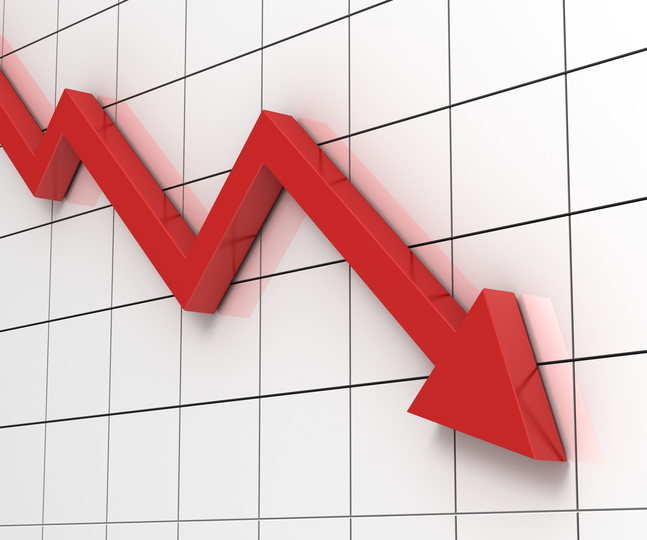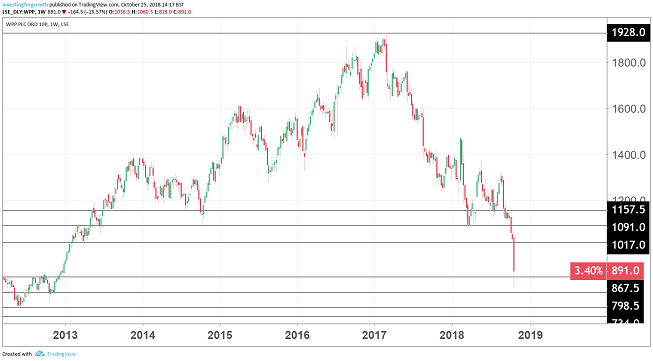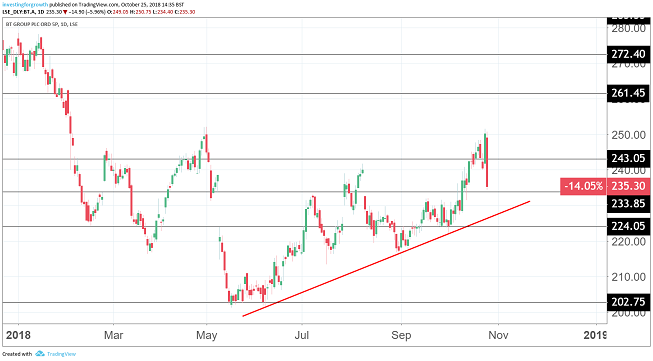WPP suffers dramatic plunge as BT also reverses
25th October 2018 14:25
by Graeme Evans from interactive investor
WPP's problems just got a whole lot worse, while BT's steady recovery has come off the rails. Graeme Evans tells us why and what the possible remedy might be.

Any BT shareholders hopeful that today's appointment of a new CEO can trigger an upturn in fortunes need look no further than WPP for a reality check.
Shares in the media and advertising giant are now trading at a six-year low after the company stunned investors today by slashing its full-year guidance in the wake of a 0.8% decline in Q3 revenues.
Since the departure of long-time boss Sir Martin Sorrell in April - replaced on a permanent basis by Mark Read in September - the high-yielding FTSE 100 stock has fallen by 25%.

Source: Tradingview Past performance is not a guide to future performance
In fairness to Read, who was in temporary charge from April, this is a continuation of the downward trend in train prior to Sir Martin's controversial departure. Regardless of who is at the helm, WPP still has to find answers to the structurally different landscape created by the likes of Google and Facebook.
That's similar to the challenge facing BT's new boss Philip Jansen, who will take over from Gavin Patterson as CEO in February. Jansen has been at the helm of global payments group Worldpay since 2013.
The structural squeeze on industries such as media and advertising was highlighted by Read in today's third quarter update, when he reiterated the need for an effective new strategy and vastly simpler WPP.
He said the previous regime had been too slow to adapt to change, with the business complicated and under-invested in core areas.
Read has moved quickly to strengthen the balance sheet by making 16 disposals to date, raising £704 million. Alongside a renewed focus on working capital, this means net debt is down by £925 million on a year earlier.
Given the pressures on the company, the new CEO has decided the best way to develop market research business Kantar will be to sell a majority stake.
Morgan Stanley, which values the Kantar business at £3.7 billion, said this may result in WPP finding a middle ground between using the proceeds for debt reduction and returning cash to shareholders. WPP currently yields 5.5% and returns about £1.2 billion a year in dividends and buybacks.
In the short-term, the immediate concern for analysts is the contrast in performance between WPP and some of its peers, with the likes of Omnicom and Publicis recently delivering well-received Q3 updates.
Liberum said:
"It would be tempting to dismiss WPP's performance as a temporary blip, as happened with Publicis in Q2, but the fact that the company has dragged down its guidance, suggests something else."
Analyst Ian Whittaker said the culprit looked to be the Media division, which is high margin but appears to be suffering significant client losses.
He still believes the share price has the potential to recover to 1,750p, while Morgan Stanley is priced at 1,425p. A strategy update planned for December is likely to be pivotal as Read sets out his plans for growth, investment in technology and a simplified structure for WPP.
His battle to manage structural change will be echoed at BT, where the reception to Jansen's appointment was far from enthusiastic today. Shares slumped 6%, with the stock not far from the six-year low seen in the summer.

Source: Tradingview Past performance is not a guide to future performance
Part of the reason for BT's decline has been the inevitable heavy spending needed to upgrade the fibre network with potentially no incremental return.
It recently announced major cost cuts as part of plans to compete with rivals who saw the future of a rapidly changing industry much quicker than BT.
These articles are provided for information purposes only. Occasionally, an opinion about whether to buy or sell a specific investment may be provided by third parties. The content is not intended to be a personal recommendation to buy or sell any financial instrument or product, or to adopt any investment strategy as it is not provided based on an assessment of your investing knowledge and experience, your financial situation or your investment objectives. The value of your investments, and the income derived from them, may go down as well as up. You may not get back all the money that you invest. The investments referred to in this article may not be suitable for all investors, and if in doubt, an investor should seek advice from a qualified investment adviser.
Full performance can be found on the company or index summary page on the interactive investor website. Simply click on the company's or index name highlighted in the article.